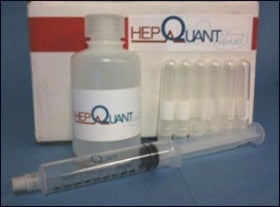Colorado company licenses CU test to assess chronic liver disease
The University of Colorado and HepQuant LLC, a Colorado-based company, have completed a licensing agreement allowing HepQuant to further develop a CU diagnostic technology to assess chronic liver disease.
All major manifestations of chronic liver disease – including cirrhosis, ascites, fibrosis, varices and encephalopathy – are linked to an impairment of the liver's portal circulation. About 15 million to 30 million people in the United States, and at least 500 million worldwide, suffer from these diseases.
The first product to be developed based on the licensed technology, HepQuant-Dual, is a noninvasive, cost-effective test that measures the liver's portal circulation using natural compounds labeled with stable isotopes. The test enables a physician to detect liver disease, measure the severity of the disease and predict risk for future complications.
The test was invented by Gregory Everson, professor and director of hepatology at the University of Colorado School of Medicine.
"This is an exciting advance for monitoring patients and provides physicians with a new tool for evaluating liver disease," Everson said. The company anticipates that clinical trials will begin late this year, with commercial availability by 2013, subject to FDA approval.
HepQuant originally optioned the technology from CU in 2008, when it received a $100,000 seed investment from the University of Colorado Technology Transfer Office to support further commercial development.
"Technology Transfer's proof-of-concept investment program helped HepQuant leverage a grant from the Colorado Office of Economic Development and International Trade and augment Dr. Everson's clinical studies with market and regulatory planning, a critical step toward a sustainable new biomedical enterprise," said Tom Smerdon, director of licensing and new business development at the CU Technology Transfer Office.


